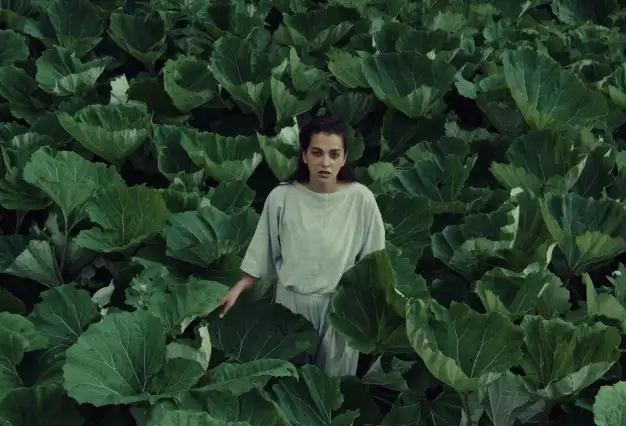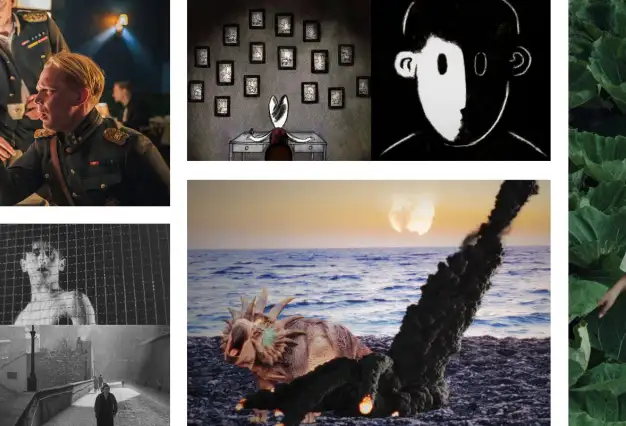
25 August 2025
To explore historical themes without rehashing trauma
Sára Zeithammerová
To explore historical themes without rehashing trauma
Sára Zeithammerová

Screenwriter and writer Sára Zeithammerová (b. 1997) is skilled at working in a wide variety of formats, from feature films and miniseries to novels. Her current projects include adaptations of two Czech bestsellers: Hana by Alena Mornštajnová and Žítkovské bohyně (The Last Goddess) by Kateřina Tučková. Both books are set in the dark periods of 20th-century Central European history, during the Holocaust and the decades of communism.
by Vojtěch Rynda for CZECH FILM / Fall 2025
What did your work on the adaptation of Hana entail?
I was about 23 years old and had no experience working on a feature film when I accepted the offer to adapt Hana. You don’t turn down an opportunity like that. My task was to revise the existing script by director Milan Cieslar to make the three main female characters—Anna, Mira, and Rosa—stand out. We finished the script, we received a production grant from the Czech Film Fund on the fourth try, and we’re now waiting for the first take after five years of development.
The Holocaust is a common theme. What makes Hana different?
Hana also deals with other themes, addressing historical events such as the turbulent prewar period and the 1950s typhus epidemic in the Moravian town of Valašské Meziříčí. The backdrop of World War II and the Holocaust is often overused to do nothing more than elevate an otherwise banal story. Hana is different. It deals with families marked not only by war and external events, but by the relationships between the family members. The novel also reflects the role of women at a time when they were typically confined to romantic ideals—I’ll marry a soldier, we’ll have children, and we’ll be happy. As if nothing else existed. Hana’s characters have so few options, they don’t even consider making different choices, which often has tragic consequences.
The adaptation of The Last Goddess is still in its early stages. How does it differ from your work on Hana?
Both The Last Goddess and Hana address historical themes from a women’s perspective. While Mornštajnová’s narrative is straightforward, Tučková intertwines two time periods and relies heavily on historical materials. Hana is an engaging and suspenseful read that is relatively easy to adapt. The Last Goddess is more complicated and difficult to adapt, and I had a hard time finding the right approach. Still, it means a lot to me, given that it’s my second collaboration with director Damián Vondráček, who I worked with on the series Five Years. In addition, since the beginning of the writing process, I’ve been collaborating with my colleague and close friend Hana Neničková. It’s intense but enjoyable to work with people I like and respect.
You work both independently and with other screenwriters, creating both original content and adaptations. What do you think suits you best?
I decide whether to work alone or in a group based on the material. Naturally, I prefer to work on my own personal projects independently. I don’t mind sharing the work when it comes to commissions. Creative dialogue even helps improve the result. For example, Hana Neničková and I complement each other perfectly. I’m a realist, maybe even a skeptic, and I tend to be very straightforward at work. Hanka is more genre-oriented, and her short film The Other Side of the Farmland is rooted in folklore, which led to her being offered a cowriting role on The Last Goddess.
You’ve also published two books, Stehy (Stitches) and Svatá (The Saint), and last year you received the Film Foundation Award for the screenplay Spící (Sleeping), about the painter Toyen. How do you decide on the best format for developing a particular theme?
Every theme deserves a slightly different medium. I’m not saying some of my screenplays wouldn’t work well as books, or vice versa, but books have the advantage of bringing you satisfaction in a shorter time. With films or television series, there are so many circumstances involved that could go wrong, and so many people, that the whole project could fall apart. With a book, it’s up to you whether you manage to finish it on time, and holding it in your hands gives you a dose of creative dopamine.
Hana and The Last Goddess were already very popular in book form, so the adaptations also have hit potential. Czechs love retro. Why do you think that is?
I’m not sure, but at this stage of my career, I realize it’s not enough for characters to just “flow through history.” The material needs to stand on its own without relying solely on the historical background. In literature and cinema, there’s a term, “Auschwitz Pop,” that’s used for films and books where the Holocaust is depicted only through clichés: shaved heads, sexual violence, hunger, cold, chimneys, etc. Czech literature and cinema also tend toward the simplistic—you often know from the start who the good guys and bad guys are, and don’t get surprised or shocked by any plot twists. I’m not interested in that kind of work, but I’ve always been fascinated by historical material, and don’t want to dismiss it just because of the clichés and stereotypes associated with it. That’s one of the reasons why I wrote The Saint. I wanted to prove that historical prose written by women about women still exists in our country, and that historical themes can be dealt with in an original way, without rehashing traumas over and over again.
What is your project The Abortionist about?
It’s my original screenplay, which led to Vratislav Šlajer inviting me to join Bionaut production company five years ago. I’m now in their writers’ room for the second season of the series Záhadné případy (Mysterious Cases), and I’m working on a podcast about screenwriting titled Dopsáno (Finished) with Petr Koubek. The Abortionist is a horror story set in the First Czechoslovak Republic (1918–1938). A woman who performs abortions is prosecuted for manslaughter after one of her patients dies. She hides in a mysterious convent, but it’s not just nuns who live there. The script is in final draft, and we’re discussing coproduction options.
In the award-winning series TBH and Five Years, you addressed current issues such as violence in schools and consent. Are you currently working on any nonhistorical material?
My audiobook Tohle musí být ten den (This Must Be the Day) was recently released on Radio Wave. It’s a collection of short stories on the theme of suicide. Suicide is not discussed much [in this country], and there’s a stigma attached to the subject, but I deal with it to some extent in both of my books. In my opinion, in today’s turbulent times, it’s beneficial to talk about suicide and suicidal people, to help destigmatize them.
The Holocaust, persecution under communism, abortion, suicide. These are all difficult topics. Are you tempted to try comedy?
Definitely not, and my comedic style wouldn’t appeal to any audience; I don’t know how to be funny in my writing. Of course, these topics can seem depressing, but there’s always a spark of hope, a chance for a better life. “Depressing” material often gives the impression that if something terrible happens to you, the rest of your life must also be terrible. I disagree. When you’re at your wit’s end, you have to find the strength to keep fighting. You can always bounce back from rock bottom.




